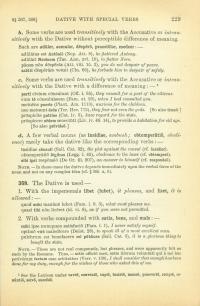367. Many verbs signifying to favor, help, please, trust, and their contraries; also to believe, persuade, command, obey, serve, resist, envy, threaten, pardon, and spare,1 take the dative.
Cūr mihi invidēs?
Why do you envy me?
Mihi parcit atque īgnōscit.
He spares and pardons me.
īgnōsce patriō dolōrī (Liv. 3.48)
excuse a father's grief
subvenī patriae, opitulāre conlēgae (Fam. 10.10.2)
come to the aid of your country, help your colleague
Mihi nōn displicet. (Clu. 144)
It does not displease me.
Nōn omnibus serviō. (Att. 13.49)
I am not a servant to every man.
Nōn parcam operae. (Fam. 13.27)
I will spare no pains.
Sīc mihi persuāsī. (Cat. M. 78)
So I have persuaded myself.
Mihi Fabius dēbēbit īgnōscere sī minus êius fāmae parcere vidēbor quam anteā cōnsuluī. (Tull. 3)
Fabius will have to pardon me if I seem to spare his reputation less than I have heretofore regarded it.
Huic legiōnī Caesar cōnfīdēbat maximē. (B. G. 1.40.15)
In this legion Cæsar trusted most.
In these verbs the Latin retains an original intransitive meaning. Thus, invidēre (to envy) is literally to look askance at; servīre is to be a slave to; suādēre is to make a thing pleasant (sweet) to.
a. Some verbs apparently of the same meanings take the accusative. Such are iuvō, adiuvō (help); laedō (injure); iubeō (order) dēficiō (fail) dēlectō (please).
Hīc pulvis oculum meum laedit.
This dust hurts my eye.
[Cf. Multa oculīs nocent. Many things are injurious to the eyes.]
Note 1— Fīdō and cōnfīdō take also the ablative (§ 431).
Multum nātūrā locī cōnfīdēbant. (B. G. 3.9)
They had great confidence in the strength of their position.
Note 2— Some common phrases regularly take the dative precisely like verbs of similar meaning. Such are: praestō esse (be on hand, cf. adesse); mōrem gerere (humor, (cf. mōrigerārī); grātum facere (do a favor, cf. grātificārī); dictō audiēns esse (be obedient, cf. oboedīre); cui fidem habēbat [(B. G. 1.19) in whom he had confidence, cf. cōnfīdēbat].
So also many phrases where no corresponding verb exists. Such are: bene (male, pulchrē, aegrē, etc.) esse [be well (ill, etc.) off]; iniūriam facere (do injustice to); diem dīcere (bring to trial, name a day for, etc.); agere grātiās (express one's thanks) habēre grātiam (feel thankful); referre grātiam (repay a favor); opus esse (be necessary); damnum dare (inflict an injury); acceptum (expēnsum) ferre (esse) [credit, charge]; honōrem habēre (to pay honor to).
b. Some verbs are used transitively with the accusative or intransitively with the dative without perceptible difference of meaning. Such are adūlor, aemulor, dēspērō, praestōlor, medeor.
Adūlātus est Antōniō. (Nep. Att. 8)
He flattered Antony.
adūlārī Nerōnem (Tac. Ann. 16.19)
to flatter Nero
Pācem nōn dēspērās. (Att. 8.15.3)
You do not despair of peace.
Salūtī dēspērāre vetuit. (Clu. 68)
He forbade him to despair of safety.
c. Some verbs are used transitively with the accusative or intransitively with the dative with a difference of meaning.
Partī cīvium cōnsulunt. (Off. 1.85)
They consult for a part of the citizens.
cum tē cōnsuluissem (Fam. 11.29)
when I had consulted you
metuēns puerīs (Plaut. Am. 1113)
anxious for the children
Nec metuunt deōs. (Ter. Hec. 772)
They fear not even the gods.
[So also timeō]
prōspicite patriae (Cat. 4.3)
have regard for the state
prōspicere sēdem senectūtī (Liv. 4.49.14)
to provide a habitation for old age
[So also prōvideō]
d. A few verbal nouns [as īnsidiae (ambush); obtemperātiō (obedience)] rarely take the dative like the corresponding verbs.
īnsidiae cōnsulī (Sall. Cat. 32)
the plot against the consul
(cf. īnsidior).
obtemperātiō lēgibus (Legg. 1.42)
obedience to the laws
(cf. obtemperō).
sibi ipsī respōnsiō (De Or. 3.207)
an answer to himself
(cf. respondeō).
Note— In these cases the dative depends immediately upon the verbal force of the noun and not on any complex idea (cf. § 366.a-b).
- With the impersonals libet (lubet, it pleases) and licet it is allowed.
quod mihi maximē lubet (Fam. 1.8.3)
what most pleases mequasi tibi nōn licēret (id. 6.8)
as if you were not permitted - With verbs compounded with satis, bene, and male.
Mihi ipse numquam satisfaciō (Fam. 1.1)
I never satisfy myself.optimō virō maledīcere (Deiot. 28)
to speak ill of a most excellent manPulchrum est benefacere reī pūblicae. (Sall. Cat. 3)
It is a glorious thing to benefit the state.Note— These are not real compounds, but phrases, and were apparently felt as such by the Romans.
Satis officiō meō, satis illōrum voluntātī quī ā mē hōc petīvērunt factumesse arbitrābor. (Verr. 5.130)
I shall consider that enough has been done for my duty, enough for the wishes of those who asked this of me. - With grātificor, grātulor, nūbō, permittō, plaudō, probō, studeō, supplicō, excellō.
Pompêiō sē grātificārī putant. (Fam. 1.1)
They think they are doing Pompey a service.Grātulor tibi, mī Balbe. (id. 6.12)
I congratulate you, my dear Balbus.Tibi permittō respondēre. (N. D. 3.4)
I give you leave to answer.Mihi plaudō ipse domī. (Hor. S. 1.1.66)
I applaud myself at home.cum inimīcī M. Fontêī vōbīs ac populō Rōmānō minentur, amīcī ac propinquī supplicent vōbīs (Font. 35)
while the enemies of Marcus Fonteius are threatening you and the Roman people too, while his friends and relatives are beseeching youNote — Misceō and iungō sometimes take the Dative (see § 413.a, Note). Haereō usually takes the ablative, with or without in, rarely the dative.
haerentem capitī corōnam (Hor. S. 1.10.49)
a wreath clinging to the head.
a. The dative is often used by the poets in constructions which would in prose require a noun with a preposition. So especially with verbs of contending (§ 413.b).
Contendis Homērō (Prop. 1.7.3)
You vie with Homer.
[In prose: cum Homērō]
Placitōne etiam pūgnābis amōrī? (Aen. 4.38)
Will you struggle even against a love that pleases you?
Tibi certat. (Ecl. 5.8)
[He] vies with you.
[tēcum]
Differt sermōnī (Hor. S. 1.4.48)
[It] differs from prose.
[ā sermōne, § 401]
Laterī abdidit ēnsem (Aen. 2.553)
[He] buried the sword in his side.
[in latere, § 430]
For the dative instead of ad with the accusative, see § 428.h.
369. Some verbs ordinarily intransitive may have an accusative of the direct object along with the dative of the indirect (cf. § 362.a).
cui cum rēx crucem minārētur (Tusc. 1.102)
and when the king threatened him with the cross
Crētēnsibus obsidēs imperāvīt. (Manil. 35)
He exacted hostages of the Cretans.
omnia sibi īgnōscere (Vell. 2.30)
to pardon one's self everything
Ascaniōne pater Rōmānās invidet arcēs? (Aen. 4.234)
Does the father envy Ascanius his Roman citadels?
[With invideō this construction is poetic or late.]
a. With the passive voice this dative may be retained.
quī iam nunc sanguinem meum sibi indulgērī aequum cēnset (Liv. 40.15.16)
who even now thinks it right that my blood should be granted to him as a favor
Singulīs cēnsōribus dēnāriī trecentī imperātī sunt. (Verr. 2.137)
Three hundred denarii were exacted of each censor.
Scaevolae concessa est fācundiae virtūs. (Quint. 12.3.9)
To Scaevola has been granted excellence in oratory.



